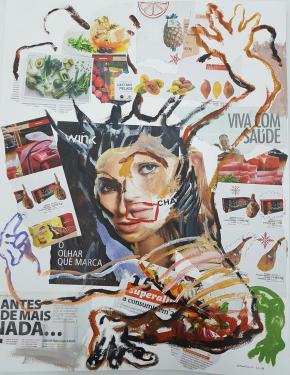La grande bellezza: a brief note on culture in Italy, today
 Eat time | 2017 | Cristiano Mangovo (courtesy of the artist and MOVART gallery)A short book by Goffredo Fofi called L’oppio del populo (elèuthera, Milan) was published in Italy last summer. Fofi is a well known literary critic and film maker. In the 1970s he was an important figure in magazines such as “Quaderni Piacentini”, “Ombre Rosse”, “Linea d’Ombra”, “La terra vista dalla luna”, “Lo straniero” and “Gli Asini” which put forward a critical take on international art, society and culture, and played a significant educative role. They privileged minority experiences and radical acts of civil disobedience. The book, which has been criticised by more mainstream Italian intellectuals, is the outcome of many years of direct observation of the national scene. It appears at a moment of profound difficulty for a country which is sliding irremediably towards a landscape of easy hatred, polemic, and disinformation. For thirty years, television - and more recently social media - has consistently and perniciously eroded critical consciousness. Deep, repeated cuts in education and research have made the situation worse.
Eat time | 2017 | Cristiano Mangovo (courtesy of the artist and MOVART gallery)A short book by Goffredo Fofi called L’oppio del populo (elèuthera, Milan) was published in Italy last summer. Fofi is a well known literary critic and film maker. In the 1970s he was an important figure in magazines such as “Quaderni Piacentini”, “Ombre Rosse”, “Linea d’Ombra”, “La terra vista dalla luna”, “Lo straniero” and “Gli Asini” which put forward a critical take on international art, society and culture, and played a significant educative role. They privileged minority experiences and radical acts of civil disobedience. The book, which has been criticised by more mainstream Italian intellectuals, is the outcome of many years of direct observation of the national scene. It appears at a moment of profound difficulty for a country which is sliding irremediably towards a landscape of easy hatred, polemic, and disinformation. For thirty years, television - and more recently social media - has consistently and perniciously eroded critical consciousness. Deep, repeated cuts in education and research have made the situation worse.
This situation is accompanied by the political world’s total incapacity to act with the tiniest iota of credibility, evacuating the possibility of an even minimally inclusive social project. Forces have risen to power which proudly declare their lack of education and reading. Through their actions they demonstrate a profound disrespect for moral order. It has become possible to publicly declare that not all humans have rights and to accuse those who save lives in the Mediterranean of being “do gooders”. This has laid the foundations for a struggle between the poor that cancels out the possibility of class struggle in an impoverished country. Except, as the sociologist Luciano Gallino has written, a class war of the rich against the poor. In this context, Goffredo Fofi writes that “culture, as it is understood today by power, and as we allow it to be understood, is no longer knowledge, but only a keen instrument to blind our consciences and turn us into accomplices”.
In fact, we cannot say that no culture is produced in Italy. There are many people producing it at many levels. Many books are published and there is a diverse cultural offer. The problem is that it is produced ever more within a circular system of events, festivals, book launches and reviews that ends up creating a closed, solipsistic system. Most codify this system as of the ‘left’, which represents for many an old order that failed miserably to achieve a more just society. The problem is that within a system of this type, almost no-one plays a truly critical, useful role for society, and the civil function of culture ends up null. The cultural scene creates only a superficial counter-narrative to dominant racism and populism. It is a comfort blanket fed by the constant self-promotion of those who write, film and produce.
Such practices become products of a profoundly narcissistic cultural market that cannot open itself to a “true us”, as Fofi writes. They forge a system of social habits seen by the majority of italians - who today live in straightforward ignorance - as meaningless. While they may be based on principles of solidarity, these values are seen as contradictory, useless and indeed noxious in failing to respect the motto “prima gli italiani”. There is a lack of the true militancy which is the task of the intellectual, in the sense of promoting the capacity to rethink the country based on pedagogy. We urgently need a return to the task of asking questions. We urgently need a return to culture as the filter between individuals and the political, broadly conceived. Without this we will not escape from the current situation that, not only in Italy, finds its reflection in the protagonist of Paolo Sorrentino’s acclaimed La Grande Bellezza: the tragic, failed, mundane visage of Jep Gambardella.
______
MEMOIRS is funded by the European Research Council (ERC) under the European Union’s Horizon 2020 research and innovation programme (no. 648624) and is hosted at the Centre for Social Studies (CES), University of Coimbra.